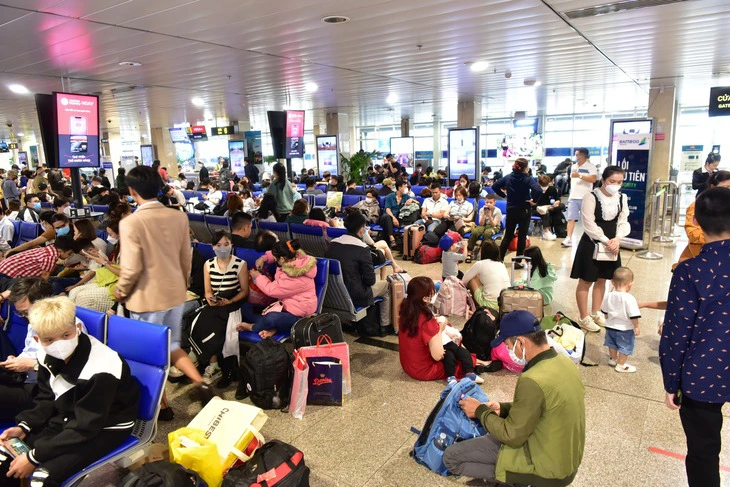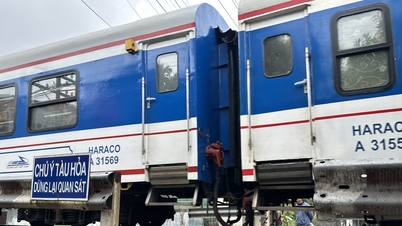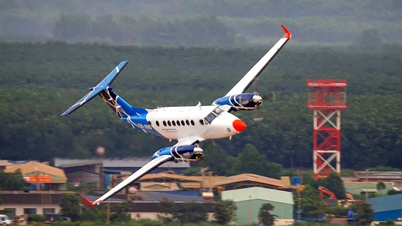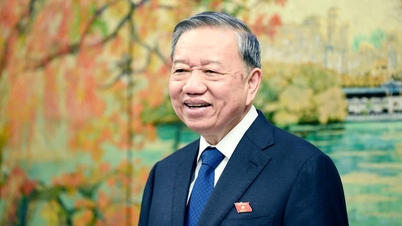
During the peak Tet holiday season, flight delays and cancellations happen frequently. In the photo: passengers waiting to board their flights during Tet - Photo: TTD
During a recent group discussion on the Law on Civil Aviation of Vietnam (amended), many National Assembly delegates raised the issue of frequent flight delays by airlines, affecting passengers' travel and plans.
Delegates suggested that there should be specific regulations on compensation for delayed passengers. Dr. Cao Vu Minh (lecturer at the University of Economics and Law, Ho Chi Minh City National University) sent Tuoi Tre Online an article analyzing this issue further.
There is an apology but compensation seems to be forgotten?
According to the law, the carrier of passengers and baggage by air must have a contract with the passenger for transportation. Passenger tickets, baggage tickets, transportation regulations, price list of transportation services and other written agreements between the two parties are part of the contract for the transportation of passengers and baggage.
Passenger delay due to the fault of the carrier is a form of violation, and the carrier is responsible for compensating for damages.
According to relevant regulations, a delayed flight is a flight whose actual departure time is more than 15 minutes later than the scheduled departure time in the base flight schedule.
In case the flight is delayed due to the fault of the carrier, the carrier is obliged to apologize to the passenger, ensure meals, accommodation, travel and bear other directly related costs, appropriate to the waiting time at the airport.
If the flight is delayed for 2 hours or more, the carrier must change the itinerary appropriately for the passenger, or transfer to another flight so that the passenger can reach the final destination of the journey, waiving the restrictions on changing the itinerary or changing the flight and related surcharges (if any) for the passenger.
In case of flight delay of 5 hours or more and passenger requests a refund of ticket price, the carrier must refund the entire ticket price. For long flight delays, the passenger also has the right to request the carrier to pay non-refundable advance compensation to passengers who have confirmed seats and tickets on the flight.
Thus, the issue of compensation for damages by the carrier has been regulated quite specifically in sub-law documents. However, the problem that arises is determining the time frame to calculate the delay.
The relevant documents only stipulate that the time limit for calculating flight delay is 15 minutes after the " scheduled departure time in the base flight schedule ". However, the " scheduled departure time in the base flight schedule" is decided by many different entities, but among those entities, there is absolutely no opinion from the customer.
This leads to the situation where passengers only find out their flight is delayed when they arrive at the airport. At that time, passengers only receive a notice that their flight is delayed due to operational reasons .
Although airlines have apologized to passengers, other obligations such as ensuring meals, accommodation, travel and bearing other costs directly related to and appropriate to the waiting time at the airport seem to be forgotten.
Need clear regulations
Currently, Clause 2, Article 53 of the draft Law on Civil Aviation of Vietnam dated September 20, 2025 ( referred to as the draft law ) has provisions on the carrier's liability for compensation for damages, but it is not really clear.
Studying points d, đ, e, Clause 2, Article 53 of the draft law shows that determining flight delay must be based on the time when " the passenger has confirmed a seat on the flight ".
With this regulation, in many cases, passengers arriving at the airport will have information about flight delays, and only then will these passengers have their seats confirmed on the flight.
Besides, points d, đ, e, Clause 2, Article 53 of the draft law only generally stipulate the obligations of the carrier when transporting but do not clearly state how long the delay will be.
For example, point d, clause 2, Article 53 of the draft Law only stipulates: " In case a passenger has been confirmed for a seat on a flight but the transportation is delayed, canceled or refused due to the fault of the carrier, the carrier must arrange a suitable itinerary for the passenger or refund the unused portion of the ticket at the passenger's request without collecting any related amount of money " .
However, if this obligation is applied to cases of flight delays of only about 30 - 40 minutes, it is not feasible and does not harmonize the interests of the carrier and the passengers. Therefore, the delay time needs to be specifically regulated in the draft law to determine the corresponding obligations.
Research shows that Clause 2, Article 53 of the draft law needs to be adjusted, clearly stipulating that in case of flight delay, cancellation or refusal to transport, there is responsibility to compensate for damages.
A delayed flight is a flight whose actual departure time (calculated from the time of aircraft choke removal) is 15 minutes later than the planned departure time in the flight schedule based on...
More than 73,000 flights were delayed.
According to statistics, in just the first 9 months of 2025, the aviation industry recorded more than 73,000 flight delays.
The two airlines that maintained an on-time performance rate of over 80% were Bamboo Airways and VASCO, with 82.1% and 81.8% respectively. Next were Pacific Airlines with an on-time performance rate of 78.5% and Vietravel Airlines with 70.6%. However, all four airlines accounted for a very low percentage of the total number of domestic flights.
Vietnam Airlines and Vietjet Air have on-time flight rates of 70% and 55% respectively. Thus, the delay rates of these two airlines are 30% and 45% respectively.
Source: https://tuoitre.vn/may-bay-bi-cham-chuyen-nhu-com-bua-co-xin-loi-nhung-chua-duoc-boi-thuong-2025110220144107.htm



![[Photo] Ho Chi Minh City Youth Take Action for a Cleaner Environment](https://vphoto.vietnam.vn/thumb/1200x675/vietnam/resource/IMAGE/2025/11/04/1762233574890_550816358-1108586934787014-6430522970717297480-n-1-jpg.webp)
![[Photo] Ca Mau "struggling" to cope with the highest tide of the year, forecast to exceed alert level 3](https://vphoto.vietnam.vn/thumb/1200x675/vietnam/resource/IMAGE/2025/11/04/1762235371445_ndo_br_trieu-cuong-2-6486-jpg.webp)
![[Photo] The road connecting Dong Nai with Ho Chi Minh City is still unfinished after 5 years of construction.](https://vphoto.vietnam.vn/thumb/1200x675/vietnam/resource/IMAGE/2025/11/04/1762241675985_ndo_br_dji-20251104104418-0635-d-resize-1295-jpg.webp)

![[Photo] Panorama of the Patriotic Emulation Congress of Nhan Dan Newspaper for the period 2025-2030](https://vphoto.vietnam.vn/thumb/1200x675/vietnam/resource/IMAGE/2025/11/04/1762252775462_ndo_br_dhthiduayeuncbaond-6125-jpg.webp)


































































































Comment (0)